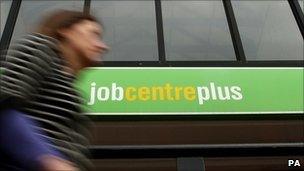UK jobs figures bring good news, but also a worry
- Published
- comments

Figures suggest the private sector is absorbing job losses in the public sector
Is it time to worry about rising employment? You might wonder how on earth I would ask such a question.
Today's figures show the number of people in work rose by 80,000 over the three months to April, alongside a significant fall in the broader measure of unemployment and a smaller rise in the claimant count.
Surely, the creation of jobs is a win-win, for the people who get them and for the economy?
The answer to that question is yes: it is certainly better for more people to be in work than before.
But there is something puzzling - and potentially troubling - about the employment growth we've seen in the past year or so.
Let me explain.
One thing we supposedly knew about this recovery was that companies came into it with a lot of spare capacity and low rates of productivity, because in the recession employment did not fall nearly as fast as output.
Another thing we supposedly knew about this recovery was that it has been relatively weak: if the official statistics are right, our national output has only risen by 2% since the last three months of 2009.
And yet, somehow that 2% rise in GDP has now required a 1.2% - or 358,000 - rise in employment over the same period.
The figures are even more striking when you consider just the private sector. Private employment has actually risen by 562,000 since the final quarter of 2009 - an increase of 2.5%.
So job growth in the part of the economy that is supposed to be driving the recovery has actually outpaced the growth in GDP.
Read back any of the past few sentences and they sound like fantastic news; worthy of a ministerial press release, even. And in many ways, they are good news.
Certainly, the figures suggest that even in a weak recovery, the private sector has had no trouble absorbing a significant fall in the number of public sector jobs, which has actually outpaced the official forecast, with a fall of 143,000 in public sector employment since last spring.
But, if you take the employment and GDP figures at face value, Britain's companies have barely made up the productivity they lost in the recession, and are far from the path they would have been on if the pre-crisis trend had continued.
Ultimately, productivity is what drives our future growth.
I know, I've written about this before, but it's a crucial question - highlighted by the Bank of England, among others, in their latest Inflation Report (see chart 3.4, page 26), external.
The more we see employment rising, this year, in a supposedly flat economy, the deeper the puzzle becomes.
There are two possibilities - or maybe three.
One is that the GDP figures are simply wrong: employers are hiring this much because output is actually rising faster than the official figures suggest. That is what you might call the good news solution to the conundrum.
The second possibility is that not only the level of UK productivity, but its potential growth rate was permanently damaged by the financial crisis - or maybe, the crisis revealed that we had been kidding ourselves for a long time about the rate at which the economy could safely grow.
As I suggested yesterday, that would be bad news - not just for the economy, but also for the government, because it would mean the public finances are in an even worse state than we thought.
And the third possibility? The third possibility would be a combination of these: the GDP figures are a bit better than we thought (as the Bank of England has long believed), but we are also seeing a prolonged hit to our productivity, not just from the crisis, but as a result of subsequent re-balancing of the economy.
To over-simplify, this explanation says the growth we're getting now will have to be different from the growth we had before, requiring different kinds of skills and companies, many of them starting from scratch.
So some of the capacity we lost in the recession - in the financial sector, perhaps - we may never need again, and some of the companies hiring workers now did not even exist before the crash.
They are not the same companies who are holding onto workers, some of whom will ultimately have to let those employees go.
If this last explanation is the right one, we may eventually get back to the same rate of productivity growth we had before, even if we never get back to the same path we were on before the fall.
But it's going to take several years - even if everything goes right.
In the meantime, the encouraging news on the employment front might be telling us something rather discouraging about the rate at which we can grow.